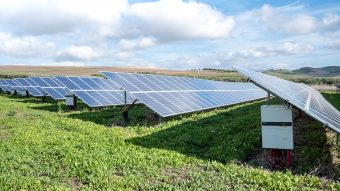
A solar power company, Navisun, has just added a couple of solar projects to a special new “pollinator-friendly” solar initiative it has launched in Massachusetts. Furthermore, the projects qualified as pollinator-friendly facilities in the Massachusetts SMART Program, which I’ll explain in a moment.
Navisun is focused on small utility-scale solar farms and community solar farms. It co-develops, acquires, owns, and operates the solar projects. The two it has just completed, one of which is a community solar farm, are fairly small projects, totaling 3,8 MW of solar power, but the company is just getting rolling and it intends to build and operate many more.
“Navisun’s pollinator-friendly expertise, developed through these projects, will also enable it to implement pollinator habitats in all applicable future solar projects through its new pollinator program,” the company writes.
The new projects — which are in Orange and Sheffield, Massachusetts — are expected to create enough electricity to power approximately 600 homes a year.
Navisun notes that it realized it could help the world even beyond the benefits of solar power it brings to the table. The company explained that it is now intent on reversing “the loss of essential pollinator habitats” and boosting food security.
More:
“Navisun worked closely with expert ecologists to initiate its new pollinator program. Navisun’s program was established in large part because environmental stressors, such as land development and pesticides, have caused the number of bee colonies per hectare to decline by 90 percent since 1962 among U.S. crops that require bee pollination. This is a critical issue, as insects such as bees and butterflies are responsible for pollinating nearly 75 percent of all crops consumed by humans. As Navisun continues to expand its project portfolio, the growth of its pollinator-friendly expertise will enable it to implement pollinator habitats in all applicable future projects, which will in turn directly support farmers, food production and the environment.”
This leadership has awarded the solar company recognition beyond the power sector. It received “pollinator-friendly certificates” from the University of Massachusetts (UMass) Amherst Clean Energy Extension for these solar projects in Orange and Sheffield, Massachusetts. That meant that they also qualified for “adder” designation under the Massachusetts SMART Program.
“Navisun is one of the first companies to apply for and receive the recent adder to the Massachusetts SMART Program. In order to be certified as a pollinator-friendly facility, site grounds must be prepared and maintained to promote native meadow habitats under and around solar panels. Among many requirements, achieving the UMass certification includes planting native flowering herbs and shrubs, desisting from using insecticide or fungicide, maintaining bee nesting habitats, and providing safe passageways along with project fencing for small wildlife.
Project partner and Chairwoman of the Sheffield municipal government’s Board of Selectmen Rene Wood shared, “Speaking as a private citizen and Sheffield’s Select Board Chair, I am delighted this award has been given to Navisun for pollinator-friendly actions at their Home Road solar array. Sheffield is a Right-to-Farm community; In 2020, the Board adopted a pollinator-friendly policy to support the Agricultural Commission and residents. This award furthers our town-wide efforts and recognizes the critical role pollinators hold in our food production and well-being.”
Author: Zachary Shanan
Source: Clean Technica



